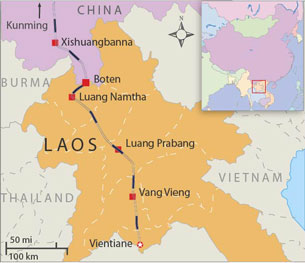 Lao officials say a Chinese rail scandal will not end plans for a high-speed railway.
Lao officials say a Chinese rail scandal will not end plans for a high-speed railway.
The proposed railway will connect China’s Yunnan province to the Lao capital Vientiane.
An ongoing corruption scandal in China is unlikely to derail plans to build a high-speed train route in Laos, despite the need for Chinese funding and expertise to initiate the project, according to a Lao official.
The Lao government expects to begin construction on the 300-mile (481-kilometer) railway, which would connect the country to neighbors Thailand and China, in April, according to state media.
China is footing 70 percent of the U.S. $7 billion price tag, but a recent investigation uncovering rampant corruption in the country’s Ministry of Railways may have put the project on the wrong track.
Beginning with the removal of longtime Railways Minister Liu Zhijun last month for what state media reported as “severe violations of discipline,” a widening scandal has left detractors questioning the scope of Beijing’s plans to build a network of domestic and international high-speed railways.
In recent weeks, allegations have surfaced of bribery, illegal contracts, and sexual liaisons in the ministry’s dealings, and an engineer in charge of nationwide research and development was removed, further embattling an agency already reeling from criticism over high ticket prices and below average service.
But none of these developments seem to concern the Lao government, which in January urged consultants to speed up social and environmental impact studies to get the project underway.
A Luang Namtha provincial official, who asked to remain anonymous, said all Laotians, particularly the residents of his border province, are looking forward to the high-speed train.
“We are happy that our country is catching up with our neighbors, and even happier that it’s going to be a high-speed train,” he said.
Trains will run at a speed of 125 miles-per-hour (200 kilometers-per-hour) from Boten, on the border of China’s Yunnan province, to the Lao capital.
“Everyone is eagerly waiting to ride the train to Vientiane.”
Compensation plans
The official added that plans are already underway to relocate villagers who will be affected by the construction.
Under the agreement signed between China and Laos last year, the Lao government is required to compensate villagers and urban dwellers who will need to be relocated from their land.
The compensation plan represents the Lao government’s 30 percent stake in the project.
But residents have expressed doubts about whether they will receive a fair amount of compensation from authorities.
The state-run Vientiane Times quoted 60-year-old Vientiane resident Kianglay Phengmeuangkhoun as saying that she expected at least 2 million kip (U.S. $250) per square meter for her land, which is conveniently located along a main thoroughfare.
“My house is located in the path of the railway and I am happy to give up my land so the railway can be built,” she said. “But I expect appropriate compensation.”
The train line will act as a link for passengers and freight traveling to and from Kunming, the capital of Yunnan province.
China also has an agreement with Thailand to build a high-speed 530-mile (850-kilometer) railway between Nongkhai on the border between Laos and Thailand and Bangkok.
Both routes would make up part of the Trans-Asian Railway Project, a United Nations plan to create an integrated freight railway network across Europe and Asia.
China has been aggressively shopping railway contracts around the world, most recently winning a U.S. $13 billion deal to build lines in Iran and a partnership to construct a high-speed rail in Kazakhstan.
Source: http://www.rfa.org/english/news/laos/scandal-03032011143136.html


